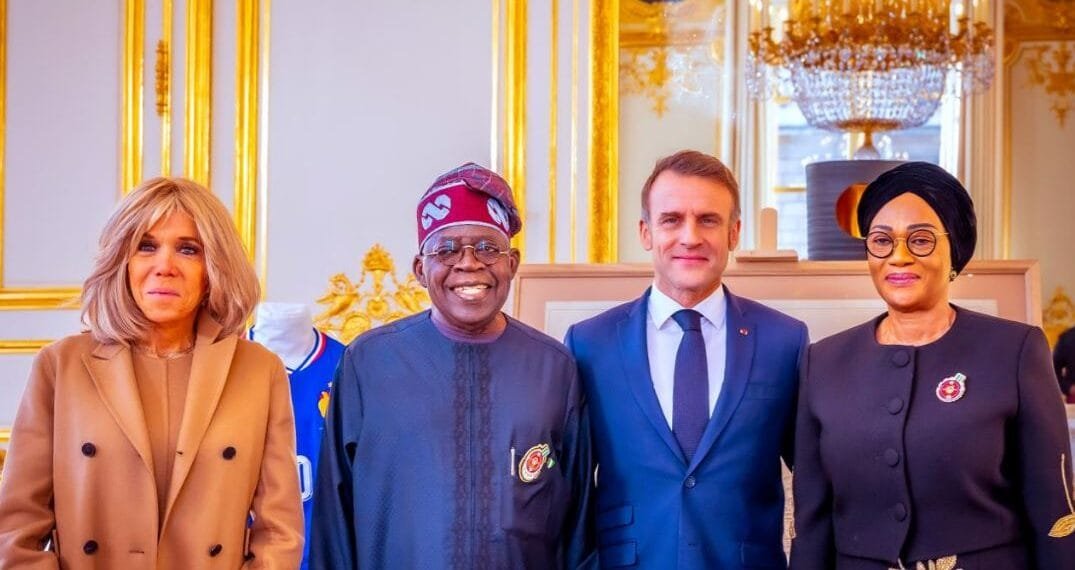President Bola Ahmed Tinubu’s recent three-day visit to France, accompanied by high-profile government officials, has reignited discussions on the bilateral relationship between Nigeria and France. The visit culminated in the signing of several memorandums of understanding, aimed at fostering business transactions and national interests that purportedly benefit both nations.
However, this development has sparked a mix of curiosity and concern among Nigerians, especially given the backdrop of growing anti-French sentiments across several African nations.
President Tinubu described the new agreements as “collaboration among equals,” a statement likely aimed at assuaging fears of an imbalanced relationship. This reassurance is critical at a time when countries like Chad, Senegal, and Burkina Faso—former French colonies—are demanding the withdrawal of French troops from their territories. While these nations emphasize their desire for a restructured, balanced relationship rather than a complete break from France, Nigeria’s deepening ties with the European power have been met with skepticism by some observers.
France has largely remained silent on the demands from its former colonies, leaving questions about its intentions and its role in Africa’s evolving geopolitical landscape. Nigeria’s approach, however, appears to signal a willingness to leverage French partnerships to drive domestic development.
Nigeria’s active engagement with France began in earnest in 1979 and gained momentum in the early 1980s when the two nations signed a five-year economic and technological agreement. During this period, France began investing heavily in Nigeria’s oil and gas sector, laying the groundwork for economic cooperation agreements that have endured for decades.
The establishment of the French-Nigerian Chamber of Commerce in the 1990s further strengthened this relationship, promoting trade and investment between the two nations. Notable ventures like the Peugeot assembly plant in Kaduna are emblematic of this partnership.
In the 1970s, the Nigerian government partnered with Peugeot to establish the Peugeot Automobile Nigeria (PAN) plant in Kaduna. Supported by French financial and technical assistance, PAN began assembling Peugeot vehicles locally, marking a milestone in economic cooperation. Despite the plant’s closure in 2012 due to declining demand and investment, the renewed Nigeria-France agreements could pave the way for its revival.
Beyond Peugeot, French companies like TotalEnergies, Orange (a telecommunications giant), and CFAO have played significant roles in Nigeria’s economy. Today, France remains one of Nigeria’s key trading partners, with bilateral trade valued at over €300 million.
Read also: I won’t succumb to blackmail, campaign of calumny, says Gov. Okpebholo
One of the focal points of the recent agreements is solid mineral exploration. However, this area has drawn criticism from some quarters. Dr. Mahdi, a sociopolitical critic, has voiced skepticism about the intentions behind these agreements, particularly in the context of France’s waning influence in its former colonies.
According to Dr. Mahdi, France may view Nigeria as a “desperate partner,” especially as other African nations sever ties or redefine their relationships with the European power. He expressed concerns that France could seek to establish military bases in Nigeria, particularly in the mineral-rich northern region, to protect its investments by force.
Criticizing President Tinubu for signing the agreements without consulting the National Assembly, host communities, or Nigeria’s security apparatus, Dr. Mahdi warned that these decisions could come with significant consequences. He argued that the lack of transparency and consultation could undermine national sovereignty and lead to unforeseen costs.
Despite the criticisms, the economic ties between Nigeria and France have yielded tangible benefits. In 2023, the two nations signed a €300 million development partnership agreement aimed at supporting Nigeria’s economic growth and improving citizens’ livelihoods.
President Tinubu’s recent visit to France was part of efforts to solidify this bilateral pact. Among the outcomes of this visit is the establishment of branches of two Nigerian banks—UBA and Zenith—in France, a move that could enhance financial integration and ease of doing business.
Additionally, the agreements include a French language training program in Nigeria and plans to establish a French cultural center in Lagos. These initiatives aim to strengthen cultural ties while promoting human capital development. Other areas of collaboration include agriculture, renewable energy, and the agricultural value chain.
While the renewed ties between Nigeria and France promise economic benefits, they also come with challenges that require careful navigation. For proponents of the agreements, the potential for job creation, technological transfer, and improved trade relations cannot be overstated. However, critics warn that a lack of vigilance could result in neo-colonial dynamics that undermine Nigeria’s long-term interests.
As Nigeria moves forward with these agreements, transparency, accountability, and inclusivity will be key to ensuring that the nation reaps the benefits of this renewed partnership without compromising its sovereignty or developmental aspirations.
The next few years will be pivotal in determining whether the Nigeria-France relationship can truly serve as a model for equitable collaboration or if it will reinforce old patterns of dependency. Only time will tell if President Tinubu’s vision of “collaboration among equals” can withstand the test of both internal and external scrutiny.







